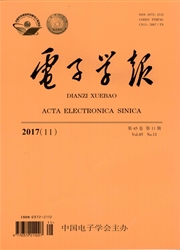

 中文摘要:
中文摘要:
针对极化空时自适应处理时目标极化状态和杂波协方差矩阵未知等实际瓶颈问题,提出了一种适应于机载极化阵列雷达的极化空时自适应匹配滤波(PST-AMF)检测算法.该检测算法先利用回波数据估计目标的极化状态,然后再将估值代入似然比得到了新的检验统计量,进一步推导了检测器虚警概率和检测概率的解析表达式,从理论上证明了该检测方法具备恒虚警(CFAR)特性.该检测器计算量比极化空时广义似然比检测器(PST-GLRT)少,易于工程实现.最后,仿真验证了在检测慢速运动目标时,其性能优于单个通道的空时自适应匹配滤波检测器(Sr-AMF),具备较强的稳健性.
 英文摘要:
英文摘要:
A novel polarization-space-time adaptive matched filter (PST-AMF) detector is proposed for slowly moving target detection in airborne poladmelric phased array radar in Gaussian clutter environments with unknown target polarization steering vec- tor and clutter covariance matrix. The adaptive polarimetric detector has been developed by using the likelihood ratio test (LRT) principle, which incorporates firstly the estimation of the target polarisation into its detector. The quantitative expressions of probabil- ity of detection and false alarm are deduced. We also prove that it ensures constant false alarm (CFAR) property with respect to the covariance matrix of noise. More remarkably, it has the same performance, but a lower complexity, than the corresponding polariza- tion-space-time generalized likelihood ratio test (PST-GLRT). The new PST-AMF detector performed significantly better than the traditional space-time adaptive matched filter (ST-AMF) detector, especially in the case of the target slowly moving. Finally, Simu- lations demonstrate the robustness of the detection algorithm.
 同期刊论文项目
同期刊论文项目
 同项目期刊论文
同项目期刊论文
 Modulation effect and inverse synthetic aperture radar imaging of rotationally symmetric ballistic t
Modulation effect and inverse synthetic aperture radar imaging of rotationally symmetric ballistic t Some results on characteristics of bistatic high-range resolution profiles for target classification
Some results on characteristics of bistatic high-range resolution profiles for target classification 期刊信息
期刊信息
